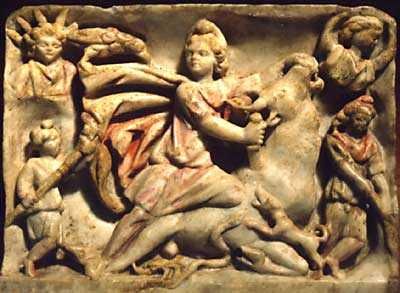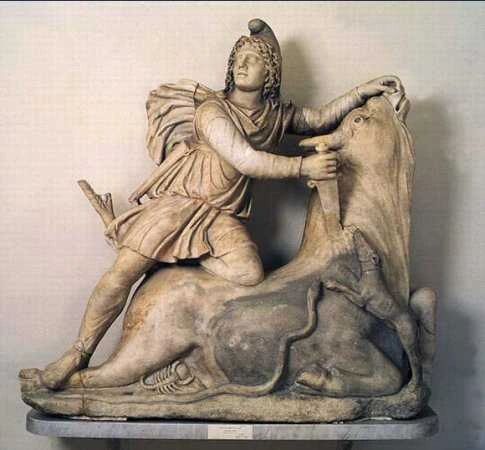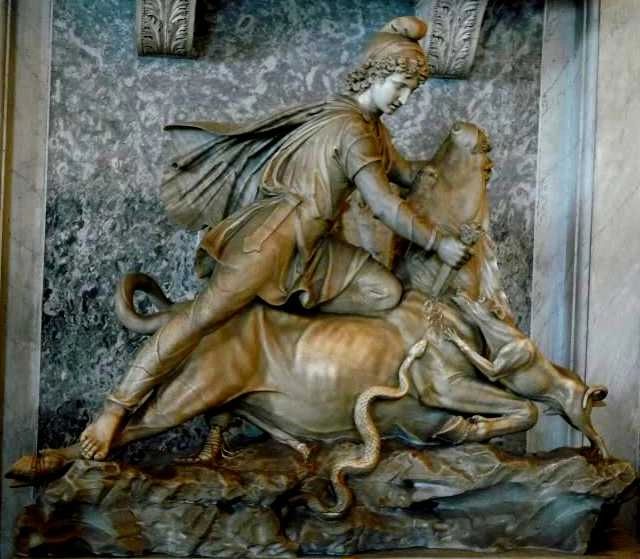
Prospect Does Christmas
A Prospect Christmas: Silent Night in Schools
The separation between church and state, perfectly imagined in the simple phrase “freedom of religion,” is rarely more easily inflamed than at the Solstice Holiday.
The Solstice, known as Christmas, Kwanzaa, Hanukkah, Saturnalia, is also Dies Natalis Solis Invicti or “Rise of the Unconquered Sun,” a celebration of the birth of Mithras.
Mithras was god of light and the spaces between earth and sky, a deity in both Zoroasterism and Hinduism and later a favorite of Roman soldiers around the time of the rise of Christianity.

Mithras was born on the 25th of December, in a cave, to a virgin (in early versions mom was a rock, giving new meaning to the term “round yon virgin”). He was sent to save the world. Any of this sound familiar? Interestingly, though Mithras was in the groove before Jesus and spread rapidly, he appealed solely to men, requiring of them a very strict code of behavior. Women were almost completely ignored, as were the poor; it was a religion of wealthy men. Still, Mithrasism was once the official religion of Rome.

In addition to other marketing problems, Mithras of that era was most frequently shown with a just slain bull. The Bull variously represented the human failings and temptations and injustices of the world that Mithras came to free humans from. Slaying a bull was considered good sport for Mithrasists. They were poor at writing things down, but great at building underground temples, a very large number of which have been found in great shape from Scotland to Syria, with dozens in Rome itself.
The two religions, Mithrasism and Christianity were in competition for some time, and in AD 345, while both were still active among the people of the Roman empire, December 25th was taken from Mithras and officially assigned as the Birthday of Jesus.
So, it is possible that if Mithrasists had used images of flowers or puppies instead of a bleeding bull, we would be prohibited from singing Mithras carols instead of Christmas carols in some public places.
But, it was Christ that people in public schools were not allowed to sing about in New Jersey, in 2004; the little baby Christ to be exact. Currently, public schools in New Jersey can ban the singing of Christian songs.
Meanwhile, back in California, a substitute teacher named Merry Hyatt is putting forth an initiative which would require public schools to allow the singing of Christian Christmas carols, like Silent Night. The text is at the bottom.
What’s wrong with that? For starters, it’s un-American.
Many hard core Christians are fond of saying the United States was founded as a Christian nation. It simply isn’t true.
It was commerce, not Puritanism that brought most “pilgrims” to the New World. Some colonies were decidedly religious, Catholic, for example. Mostly, though, the Founding Fathers and their new nation were agnostic, taking no stand on faith at all, but priding themselves on being rational men not given to superstition.
But, come on, certainly there is no harm in singing “Silent Night?”
Really? This is not merely an academic problem, it is a very real problem for Jewish children, Rastafarian children, the children of Buddha and Islam, all Americans, all entitled to freedom of, and from, religion. These children often have to sit quietly, in a government building, while those around them profess a faith they do not believe. They are given the choice of pretending to participate or of missing the celebration and treats to go sit “in study hall.”
Atheists and agnostics also have children, and some remember Madalyn Murray O'Hair, an American atheist who sued to prevent state sponsored prayer in school. O’Hair was once called the “most hated woman in America”, and many good Christians publicly rejoiced when O’Hair, her son and granddaughter were found murdered and dismembered. Even so, others, even many Christians, consider O’Hair a patriot, for keeping religion out of government and government out of religion.
Given that Americans have freedom of religion, including the right not to worship, is it still right to sing “Away in the manger, no crib for his bed, the little Lord Jesus lay down his sweet head?” Even “secular holiday carols often refer to “Saint Nicholas,” not a big saint in Islam, and still a Christian symbol.
There is another problem with the “Christmas Carol Proposition;” a corollary to singing Christian songs in public buildings, and that is that other religions might well insist that their religious holidays are also observed. There are still a few Mithrasists around; are you ready have a bull sacrificed in a classroom near you?
Merry Mithrasmas!

52710. The people of Califomia find and declare both of the following:
(a) Listening to, or performing, Christmas music during the holiday season is a
longstanding American tradition and a significant element of our cultural heritage as
Americans.
(b) The parents and guardians of public school children should have the right to
decide whether or not their children may hear Christmas music in the classrooms and assemblies at those schools.
52711. As used in this article, "Christmas music" includes, but is not necessarily
limited to, carols, songs, and instrumental works whose subject matter relates to the
celebration of the Christmas holiday or to the season during which that holiday is
observed.
52712. (a) Each public elementary and secondary school shall provide
opportunities to its pupils for listening to or performing Christmas music at an
appropriate time of year. The appreciation or performance of the Christmas music may
be incorporated into the subject matter of an arts or social studies class, presented for
cultural enrichment during a school assembly, or both.
(b) Each public elementary and secondary school shall provide the parent or
guardian of a pupil with written notice of the presentation or performance of Christmas
music in a classroom or assembly at least 21 calendar days before that pupil would be
required to be present for the presentation or performance of the Christmas music. The
written notice provided to the parent or guardian shall include a tear-off slip or other
method for the parent or guardian to inform the school if he or she chooses that the
pupil not be present for the presentation or performance of the Christmas music.
(c) A pupil who is not present for the appreciation or performance of Christmas
music pursuant to the expressed choice of his or her parent or guardian shall be provided
with an appropriate alternative to the arts or social studies subject matter served by the
Christmas music in the classroom or the cultural enrichment served by the Christmas
music in a school assembly.
52713. (a) Notwithstanding the Tort Claims Act or any other provision of law,
this article may be enforced by a civil action brought in superior court by any of the
following:
(1) A parent or guardian of an affected public school pupil either on his or her
own behalf or on behalf of that pupil.
(2) An adult resident of an affected school district.
(3) The governing board of an affected school district.
(b) The superior court may issue an injunction, or award money damages or
attorney's fees, or may order any or all of these remedies, as it finds appropriate in
handling a civil action brought under this section.
- 0-
The separation between church and state, perfectly imagined in the simple phrase “freedom of religion,” is rarely more easily inflamed than at the Solstice Holiday.
The Solstice, known as Christmas, Kwanzaa, Hanukkah, Saturnalia, is also Dies Natalis Solis Invicti or “Rise of the Unconquered Sun,” a celebration of the birth of Mithras.
Mithras was god of light and the spaces between earth and sky, a deity in both Zoroasterism and Hinduism and later a favorite of Roman soldiers around the time of the rise of Christianity.

Mithras was born on the 25th of December, in a cave, to a virgin (in early versions mom was a rock, giving new meaning to the term “round yon virgin”). He was sent to save the world. Any of this sound familiar? Interestingly, though Mithras was in the groove before Jesus and spread rapidly, he appealed solely to men, requiring of them a very strict code of behavior. Women were almost completely ignored, as were the poor; it was a religion of wealthy men. Still, Mithrasism was once the official religion of Rome.

In addition to other marketing problems, Mithras of that era was most frequently shown with a just slain bull. The Bull variously represented the human failings and temptations and injustices of the world that Mithras came to free humans from. Slaying a bull was considered good sport for Mithrasists. They were poor at writing things down, but great at building underground temples, a very large number of which have been found in great shape from Scotland to Syria, with dozens in Rome itself.
The two religions, Mithrasism and Christianity were in competition for some time, and in AD 345, while both were still active among the people of the Roman empire, December 25th was taken from Mithras and officially assigned as the Birthday of Jesus.
So, it is possible that if Mithrasists had used images of flowers or puppies instead of a bleeding bull, we would be prohibited from singing Mithras carols instead of Christmas carols in some public places.
But, it was Christ that people in public schools were not allowed to sing about in New Jersey, in 2004; the little baby Christ to be exact. Currently, public schools in New Jersey can ban the singing of Christian songs.
Meanwhile, back in California, a substitute teacher named Merry Hyatt is putting forth an initiative which would require public schools to allow the singing of Christian Christmas carols, like Silent Night. The text is at the bottom.
What’s wrong with that? For starters, it’s un-American.
Many hard core Christians are fond of saying the United States was founded as a Christian nation. It simply isn’t true.
It was commerce, not Puritanism that brought most “pilgrims” to the New World. Some colonies were decidedly religious, Catholic, for example. Mostly, though, the Founding Fathers and their new nation were agnostic, taking no stand on faith at all, but priding themselves on being rational men not given to superstition.
But, come on, certainly there is no harm in singing “Silent Night?”
Really? This is not merely an academic problem, it is a very real problem for Jewish children, Rastafarian children, the children of Buddha and Islam, all Americans, all entitled to freedom of, and from, religion. These children often have to sit quietly, in a government building, while those around them profess a faith they do not believe. They are given the choice of pretending to participate or of missing the celebration and treats to go sit “in study hall.”
Atheists and agnostics also have children, and some remember Madalyn Murray O'Hair, an American atheist who sued to prevent state sponsored prayer in school. O’Hair was once called the “most hated woman in America”, and many good Christians publicly rejoiced when O’Hair, her son and granddaughter were found murdered and dismembered. Even so, others, even many Christians, consider O’Hair a patriot, for keeping religion out of government and government out of religion.
Given that Americans have freedom of religion, including the right not to worship, is it still right to sing “Away in the manger, no crib for his bed, the little Lord Jesus lay down his sweet head?” Even “secular holiday carols often refer to “Saint Nicholas,” not a big saint in Islam, and still a Christian symbol.
There is another problem with the “Christmas Carol Proposition;” a corollary to singing Christian songs in public buildings, and that is that other religions might well insist that their religious holidays are also observed. There are still a few Mithrasists around; are you ready have a bull sacrificed in a classroom near you?
Merry Mithrasmas!

52710. The people of Califomia find and declare both of the following:
(a) Listening to, or performing, Christmas music during the holiday season is a
longstanding American tradition and a significant element of our cultural heritage as
Americans.
(b) The parents and guardians of public school children should have the right to
decide whether or not their children may hear Christmas music in the classrooms and assemblies at those schools.
52711. As used in this article, "Christmas music" includes, but is not necessarily
limited to, carols, songs, and instrumental works whose subject matter relates to the
celebration of the Christmas holiday or to the season during which that holiday is
observed.
52712. (a) Each public elementary and secondary school shall provide
opportunities to its pupils for listening to or performing Christmas music at an
appropriate time of year. The appreciation or performance of the Christmas music may
be incorporated into the subject matter of an arts or social studies class, presented for
cultural enrichment during a school assembly, or both.
(b) Each public elementary and secondary school shall provide the parent or
guardian of a pupil with written notice of the presentation or performance of Christmas
music in a classroom or assembly at least 21 calendar days before that pupil would be
required to be present for the presentation or performance of the Christmas music. The
written notice provided to the parent or guardian shall include a tear-off slip or other
method for the parent or guardian to inform the school if he or she chooses that the
pupil not be present for the presentation or performance of the Christmas music.
(c) A pupil who is not present for the appreciation or performance of Christmas
music pursuant to the expressed choice of his or her parent or guardian shall be provided
with an appropriate alternative to the arts or social studies subject matter served by the
Christmas music in the classroom or the cultural enrichment served by the Christmas
music in a school assembly.
52713. (a) Notwithstanding the Tort Claims Act or any other provision of law,
this article may be enforced by a civil action brought in superior court by any of the
following:
(1) A parent or guardian of an affected public school pupil either on his or her
own behalf or on behalf of that pupil.
(2) An adult resident of an affected school district.
(3) The governing board of an affected school district.
(b) The superior court may issue an injunction, or award money damages or
attorney's fees, or may order any or all of these remedies, as it finds appropriate in
handling a civil action brought under this section.
- 0-
